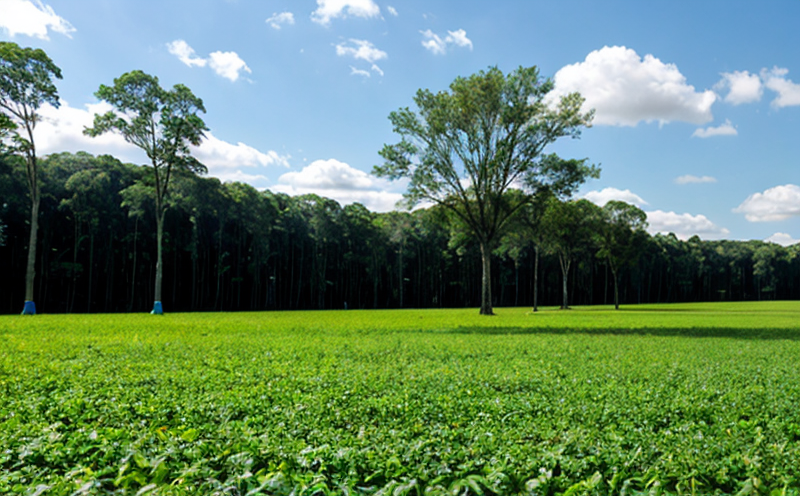Post-Market Environmental Surveillance Testing
In today's rapidly evolving market landscape, ensuring product safety and sustainability is paramount. Post-Market Environmental Surveillance Testing (PMEST) provides a critical function by monitoring consumer products after they have entered the market to identify potential environmental impacts or risks that may not have been apparent during pre-market testing.
This type of testing is particularly important for companies seeking to maintain compliance with regulatory requirements and protect their brand reputation. By conducting PMEST, organizations can gather actionable data on how their products perform in real-world conditions over extended periods. This information helps identify any environmental hazards or inefficiencies that could impact the product's lifecycle.
For instance, PMEST might involve testing for trace amounts of hazardous substances like PFAS (Per- and Polyfluoroalkyl substances) in textiles or plastics exposed to various environmental conditions over time. The goal is not only to detect these issues early but also to provide insights into how products can be improved to enhance sustainability.
At [Laboratory Name], we employ a rigorous approach to PMEST, leveraging advanced analytical techniques and state-of-the-art equipment to ensure accurate results. Our team of experts works closely with clients to tailor testing protocols that align with specific product attributes and market needs. From sample preparation to final analysis, every step is meticulously documented to provide transparency throughout the process.
Our methodologies adhere strictly to international standards such as ISO 17025 for proficiency and accuracy in our tests. We use a combination of laboratory-based assessments combined with field observations where necessary. This comprehensive approach ensures that we capture all relevant variables affecting product performance under different environmental conditions.
Test Parameters
The specific parameters measured depend on the nature of the product and its intended use but typically include:
- Environmental exposure levels (temperature, humidity, light)
- Emission rates of volatile organic compounds (VOCs) or other pollutants
- Leaching potential for hazardous materials
- Durability and resilience against degradation from natural elements
- Biodegradability and composting capabilities where applicable
Our laboratories are equipped with high-precision instruments capable of detecting even minute concentrations of harmful substances. This allows us to provide precise data that can be used both internally by R&D teams for continuous improvement efforts as well as externally when reporting findings back to regulators or consumers.
Scope and Methodology
Our scope encompasses a wide range of consumer products, including but not limited to electronics, textiles, packaging materials, personal care items, and household goods. We cater specifically to those involved in quality management, compliance officers, R&D engineers, and procurement professionals who need reliable environmental performance data post-market.
The methodology involves several key stages:
- Initial Sample Collection: Samples are collected from representative units of the product batch. These samples are then prepared according to standard procedures before being analyzed further.
- Laboratory Analysis: Using sophisticated analytical tools, we measure various environmental indicators such as emissions, leachates, and biodegradability rates.
- Data Interpretation & Reporting: Our experts interpret the collected data to determine compliance with relevant standards and guidelines. Reports are prepared detailing findings along with recommendations for any necessary corrective actions.
Throughout this process, our aim is to provide robust evidence supporting claims made about a product's environmental impact, helping companies make informed decisions regarding future developments or adjustments needed based on current market trends.
Environmental and Sustainability Contributions
- Promoting Regulatory Compliance: By identifying non-compliant products early, companies can avoid costly recalls and penalties.
- Enhancing Brand Reputation: Demonstrating a commitment to sustainable practices through transparent PMEST results builds trust among consumers.
- Driving Innovation: Insights gained from PMEST help drive innovations aimed at reducing negative environmental impacts throughout the product lifecycle.
- Supporting Circular Economy Initiatives: Understanding how products behave in real-world conditions aids in designing more recyclable or biodegradable alternatives.
Our services play a crucial role in fostering sustainable practices within industries, ultimately contributing to healthier ecosystems and communities around the world.
Competitive Advantage and Market Impact
Implementing Post-Market Environmental Surveillance Testing offers significant competitive advantages by providing early detection of potential issues, enabling proactive problem-solving. Companies that invest in PMEST gain a deeper understanding of their products' true environmental footprint post-market, allowing them to innovate more effectively and stay ahead of regulatory changes.
The ability to demonstrate robust sustainability credentials through verifiable data gives businesses an edge over competitors who may not have conducted similar tests. It also enhances customer confidence, potentially leading to increased sales and market share growth.
In today's increasingly environmentally conscious world, consumers are more likely to choose products from brands that prioritize eco-friendliness. By partnering with us for PMEST, companies can ensure they meet these expectations while simultaneously contributing positively towards global sustainability goals.





